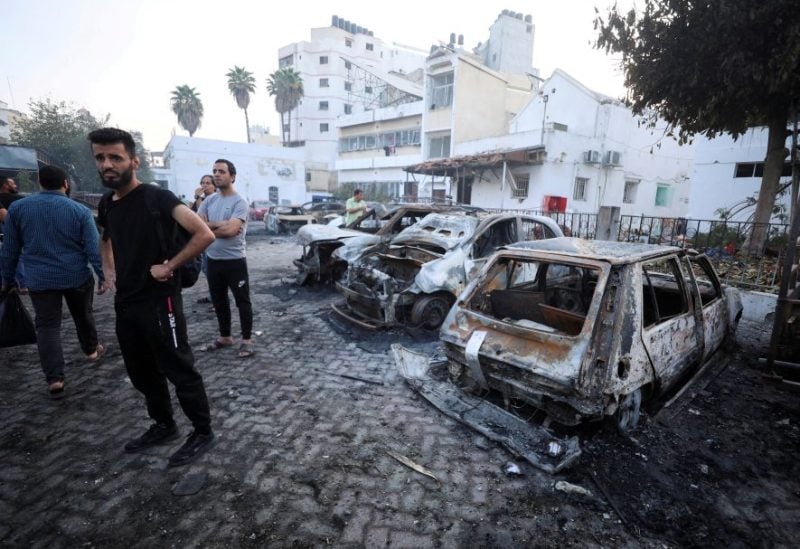
People inspect the area of Al-Ahli hospital where hundreds of Palestinians were killed in a blast that Israeli and Palestinian officials blamed on each other, and where Palestinians who fled their homes were sheltering amid the ongoing conflict with Israel, in Gaza City, October 18, 2023. REUTERS/Mohammed Al-Masri/File Photo
The escalation of military developments in the Gaza Strip has raised significant concerns about the widening of the conflict in the Middle East region and the involvement of other parties, threatening an expansion of warfare in an area that has suffered decades of conflicts.
Analysts believe that the ongoing situation between Israel and Hamas, along with Israel’s intention to carry out a ground invasion of the Gaza Strip, poses a serious threat to the situation. There is also the possibility of other parties entering the war.
Analysts through “Sawt Beirut International” suggest that since the announcement of “Operation Al-Aqsa flood” and the stunning blow that Israel received, unprecedented in its history, the U.S. administration rushed to assess the Israeli situation, which displayed weaknesses at various political and military levels. The events were likened to and resembled the aftermath of the September 11 attacks. This explains the significant military and diplomatic support from the United States to Israel.
Analysts consider that this American support has prompted the involvement of other countries in the conflict, such as Russia and China, and has led to a strong stance from Egypt and Jordan. Additionally, there have been coordinated efforts from Gulf countries rejecting any displacement of Palestinians from the Gaza Strip.
However, with the Israeli side’s inclination to launch its aggression on the Gaza Strip, starting from the fourth day and its attempts to impose plans that involve forced displacement of the Gaza population towards its southern regions or pushing them towards an “alternative homeland” beyond the borders of Gaza, analysts say that the Russian stance has moved from a phase of “cautious monitoring” of the events to a phase of “calculated interaction” with them. It seems that a Russian position is emerging that condemns both Hamas and Israel, but at the same time, it appears to lean more towards the former. This position is reflected in the official condemnation by Russian President Vladimir Putin and Foreign Minister Sergey Lavrov of the Western approach to the event and its developments. Moscow sees what is happening in Gaza as an expression of the “failure of Washington’s policies in the Middle East” because, according to Putin’s statements, “it monopolized the decision on the settlement and marginalized other parties.” Putin went further to say, “The essence of the problem is not allowing the Palestinian people to establish their state.”
However, for Russia and its President Vladimir Putin, there are changing considerations. They see that the state of “security coordination” with Israel in Syria over the past years has not prevented Israel from adopting a “wavering” stance regarding the Russian war in Ukraine, for example. It’s worth noting that Russia has not classified Hamas as a terrorist group, unlike the United States and Europe. Instead, Russia has maintained a balanced relationship with Hamas over the years. This raises an important question about the possibility of Russia’s support for Hamas in its current confrontation with Israel, even if it means openly declaring a politically supportive stance for the resistance. This move could lead to a “balancing” of the unlimited European-American support for Israel, both internationally and in terms of military and intelligence support.
According to analysts, it appears that Russia’s interactions here have focused on criticizing the European-American stance and its monopolization of the Israeli-Palestinian conflict file for years. However, Russia has not, up to this moment, taken any “prominent” stance indicating its desire to play a role in the conflict that would balance or challenge the Western-American role. This is with the exception of the resolution project it submitted to the Security Council to cease fire for humanitarian reasons, which was not passed due to the veto used by the United States and others.